-
Jyoti Subramanian, in
her inimitable style, writes about her 11 days Ayurveda detox treatment, the
why’s and wherefores.
Mana means home in
Malayalam, it is a term used for family homes in Kerala that were practitioners
and patrons of and actively supported local art forms like Kathakali, classical
music, percussion, literature, Vedic and Sanskrit learning; martial art like
Kalaripayattu and Ayurveda.
Poomully Mana is
situated on a three-acre property of the Poomully family spanning a 500 years
old history as patrons of Ayurveda. I was here for an eleven day detox
programme, the minimum number of days offered by them. Anything less was not
permitted as it was against the system.
During eleven days I
got to know more personally how the authentic Ayurveda system was being
followed without dilution or giving in to modern day spa style demands.
The centre traces its
origin back in modern days to 1879 when the late Sri Cherukulappuram Krishnan
Namboodiri completed his education in the ancient Koodallur Gurukula system, began practice and sharing this learning
with others at Poomully Mana in the tradition of the guru shishya parampara. Today
their senior consulting physician is a product of this guru shishya tradition
and was a disciple of the erstwhile late Sri Aramthampuram Poomully.
As my taxi sped from
Kochi airport to Peringode in Palakkad district, I was overtaken by nostalgic
memories of my childhood summer vacations spent here. I was returning to my
home district after many decades in Chandigarh, North India.
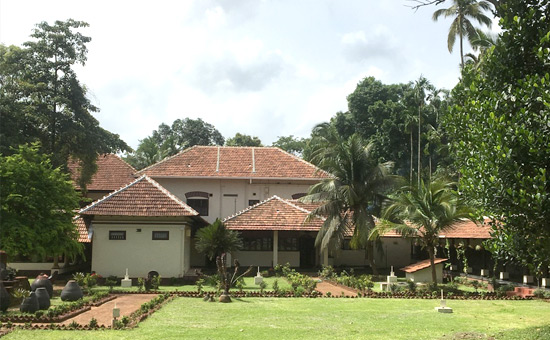 Sight of these buildings set the tone for the detox program.
Sight of these buildings set the tone for the detox program.
The location of the
centre was everything promised by their website, nestled in the lap of a
wondrous green bowl, it was quintessential Kerala, god’s own country. Two
ancient grand old trees gave witness to the antiquity of the place.
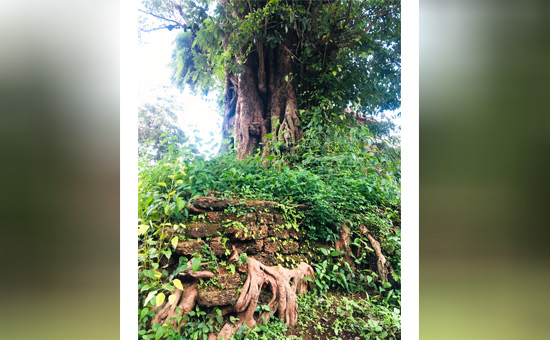 Ancient tree.
Ancient tree.
The room where I stayed
was spacious and airy; I had opted for single occupancy, no air conditioner and
had declined the use of their Wi-Fi. I had also decided not to switch on the
television for the duration of my stay even though most rooms were equipped
with a TV and A/c.
DAY 1
This was an
introduction to and a familiarisation between Physician and patient. The centre
was very clear about the fact that they were not a spa but a treatment centre
hence patient and not client!
Senior physician Dr.
Devan came to check me accompanied by Drs. Aparna and Arathi, both daughters in
law of the Poomully family and proficient in the Ayurveda tradition of the
Poomully system of healing. My tridosha was checked and a treatment regime prescribed.
Tridoshas are the three
underlying elements in every body governing physical, emotional and spiritual
wellbeing. They correlate with the four humours of the Hippocratic medicine. Ayurveda
physicians study the subtle vibrations in the wrist, separate from the pulse to
determine the treatment to be prescribed for patients.
As I had no ailments
my treatment was essentially for detox and rejuvenation.
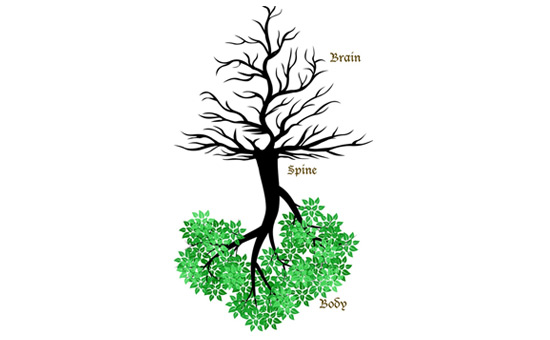 Inverted tree of treatment.
Inverted tree of treatment.
DAY 2 TO
8
The brain and the
stomach are considered of utmost importance in the Ayurveda treatment. Akin to
the inverted tree analogy of life in the Bhagavad Gita, Ayurveda looks at the
brain as the roots. The roots are saturated with medicated oils so that the
healing is carried down through the nervous system in the spine to every part
of the physical body.
I was prescribed Shirodhara for 7 days with Abhayanga to improve circulation for
more efficient absorption of the medicines. Each of the seven days the medicine
worked on a different layer starting from outside in- skin, blood, muscle, bone,
bone marrow, endocrine glands and organs. Simultaneously it also worked on the
seven Chakras - Muladhar, Swadhishthan, Manipur, Anhad, Vishuddhi, Agnya and
Sahasrahara.
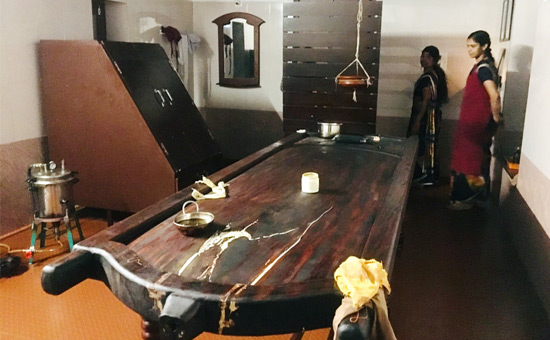 Inside treatment room.
Inside treatment room.
Every treatment began
with the ladies chanting the mantra invoking Dhanawantari, god of medicine and the
avatar of Vishnu who first appeared with the nectar during the samudra manthan. Om Dhanawantari Murtiye Namaha, Chitra who was doing the actual
hands on treatment on me would chant with devotion as she respectfully started.
The sacredness of this was not lost on
me as I deeply felt love and respect for the physical body that houses our
soul, both the body of the patient and the healer represented the idol, murti
of Dhanavwantari!
Being a long time
Kriya Yoga practitioner the detox was very palpable for me, the realisation of
the cleansing of every layer of the body, emotions and mind very defined and
definite. The final 7th day of clearing the mind brought forth some
very lucid dreams, a sloughing off of deep seated
anxiety and fears. This was confirmed by some of the other patients who
also had experiences of disturbing dreams on this day, proof that healing takes
place at very deep levels.
Each day was
disciplined from 6 in the morning to early supper at 7:30 then bed. We were
asked not to sleep in the afternoon to maximise circulation and combat
lethargy. We were also asked to walk and sit at intermittent intervals and not
stay stationary for long periods.
The stomach, now
increasingly recognised as the second brain by western medicine, was the second
organ of attention after the brain. Regular kashayam
– a water decoction of herbs was administered morning and evening to flush
accumulated toxins from the stomach. The junior doctors made sure we emptied
the glass in front of them… I guess some patients may otherwise empty it down
the sink! The taste could be unbearable if you are not used to it, but as I was
introduced to these concoctions, castor oil and kashayams as a child so had no
problem downing it in a few gulps.
Food was cooked
supervised by a family member and though simple it pacified all five tastes of
sweet, sour, salty, bitter and pungent leaving a great sense of satisfaction.
A small Basti, enema of medicated oil was
administered after the midday meal everyday, to replenish the body as the oil
stays in the body and the colon absorbs the medicine and it is carried to the
whole body.
DAY 9 TO
11
Once the body is fully
prepared for detoxification, it was ready for panchakarma. This took place on the last three days for me. The
decoction basti is administered early morning on an empty stomach. I was a bit
nervous but Dr. Aparna was present and the whole process got over very
smoothly. Both doctors made sure one of them was present at every basti, gently
explaining the process and taking me through it.
The food served was
special on these days, very light rice kanji
with mildly salted vegetables. All internal medications now stopped.
The body in these last
three days felt nascent and tender like a newly born baby. I felt a lightness
and purity in my physical body as if all the toxins had been scraped clean, as
they had been.
DAY 12
My taxi came to pick
me up in the early hours and I was ready to head back to boisterous Punjab and
the cacophony of the city.
SOME SPECIAL
SALIENT FEATURES OF POOMULLY MANA
It was very heartening
to see that most men and women who worked here were from local Peringode. The
centre is giving back to the community with employment
to locals, training them to administer expert Ayurvedic treatment. Care
was taken to start the treatment for women patients after 8:30am so the women
workers could finish their household chores and send their children to school
before coming to the centre. All mobile phones have to be deposited at the gate
so throughout the treatment. I had no experience of the staff busy on the
phone!!
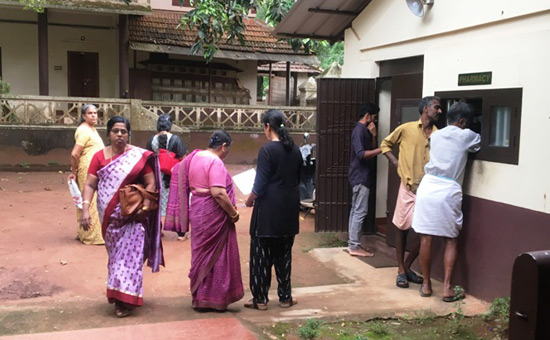 OPD dispensary.
OPD dispensary.
The centre runs an OPD
and Pharmacy for locals so they could take benefit of the expertise of the
senior doctors.
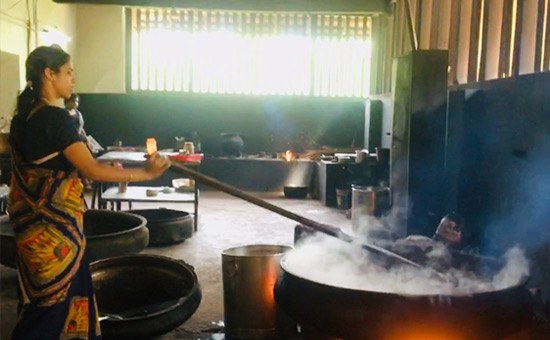 Aushadshala.
Aushadshala.
In an aushadshala, in the temple premises, medicines to be used at the treatment
centre are made with great care. I was lucky to see the medicated oil for the
oil enema being prepared over five days. For four days the herbs are steeped
and boiled to make the decoction and on the fifth day sesame oil and milk
added. About 600 litres of oil is made at one time and 30 litres used everyday
for treatments.
CONTINUING
THE KALARI TRADITION
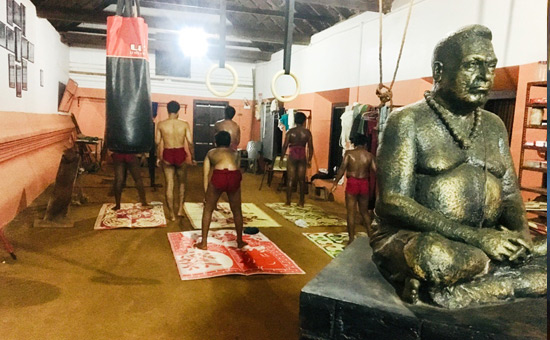 Kalaripayattu
Kalaripayattu
The tradition of
supporting the Kerala martial arts of Kalaripayattu is kept alive here. The
practice is performed on mud floors and the room is a long hall in the outer
premises of the temple. Equipped ropes, roman rings, parallel bars and a
punching bag, children from the village, who come after school in the evening,
are trained here in yoga and strength and agility building exercises.
Many of us from the
centre would go and sit there in the evening seeing children train under the watchful
eye of a local teacher and the imposing statue of
Poomully Aramthampuran, who was known for his expertise in this martial
art.
Kalari is one of the
oldest martial art traditions still in existence, its origins dating back to 3rd
century BCE. Interestingly Lord Parashurama taught it with weapons and by Sage
Agastya without weapons.
Further, interesting
is the fact that in 5th or 6th century it was believed
that a son of Pallavi Raja, who was a Bodhidharma spread
this spiritual art in China and it became known as Kung Fu.
THE JEWEL IN THE CROWN - THE RAMA TEMPLE
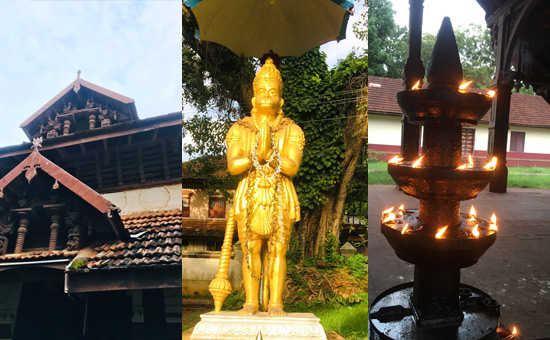 Rama Mandir, Hanumanji and Deepam.
Rama Mandir, Hanumanji and Deepam.
My favourite spot
every evening, when we were allowed to step out of the centre, was this old
temple. Hanuman himself is said to have established the murti of Sri Rama here.
Only local people
visited the temple hence the traffic was limited to 10-20 people every evening.
That gave me a lot of silent moments to go deep into my sadhana.
I returned to
Chandigarh with a resolution to come here once every year for a complete detox
and rejuvenation.
About
Poomully Mana
To know visit their website Contact poomully@gmail.com Shri Vasudvan Poomully
Mana, 91 95620 33066 and 91 89439 33977. It is about 90 kms from Cochi Airport,
takes about two and a half hours. Cost per day in first half of 2019 was Rs 4,500/
inclusive of stay and treatment.
To know about Ayurveda
Author has been teaching the practices of the Siddhanath Yoga
Parampara since 1999. Her site is https://www.ayu.yoga/the-lineage